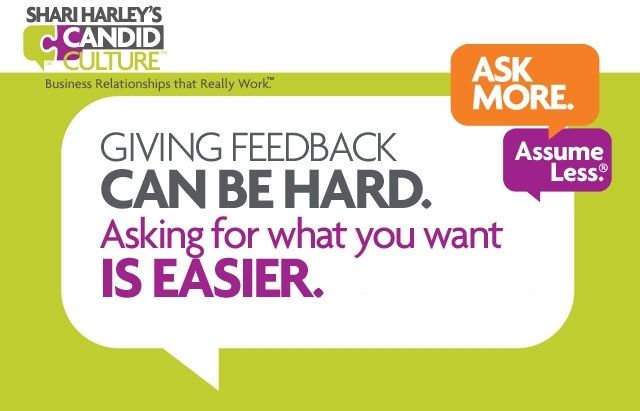Practice Feedback Prevention – Ask for What You Want
Think about all the people in your life who frustrate you. The employees who turn in work without checking for errors. The person who cancels meetings two minutes before meetings are scheduled to start. And in personal relationships, our friends who come late, cancel, or just aren’t in touch as often as we’d like.
These situations annoy us, but we often don’t say anything because giving feedback feels too hard. Why risk the person’s defensiveness? Or we don’t think addressing the situation will make a difference. Or perhaps we don’t feel we have the right to speak up.

Giving feedback can be hard. Asking for what you want is easier, but most of us aren’t clear about our requests and expectations.
The question is why? If making a request is easier than asking someone to change their behavior, why not ask for what you want upfront? Why wait until expectations are violated to make a request? The answer is simple.
We don’t think we should have to make requests. We assume our employees, coworkers, and friends will do things as we do. And most of these assumptions are unconscious. We don’t even think about it.
We would never turn in work without checking it for accuracy or come to a meeting late. We would never not send a thank you card after receiving a gift or miss a close friend’s birthday, so we (unconsciously) assume others won’t either. And when people violate our unstated expectations, it feels too hard to speak up, so we don’t.
I’m going to suggest you approach relationships differently –more proactively.
Ask for what you want at the beginning of a relationship, project, or meeting. Make requests at the onset of anything new. Set clear expectations. If you want to start and end meetings on time, tell people that during your first meeting. If it bothers you when people wear shoes in your house, tell visitors when they arrive, or even better, tell them before they arrive.
If you have an existing behavior you want to shift, simply say, “I realized I didn’t tell you that starting and ending meetings on time is really important to me. Going forward, we’re going to start and end all meetings on time. So please be ready for that.” Tell visitors to your home, “I realized that I forgot to tell you that we don’t wear shoes in our house.” It’s never too late. Don’t expect people to guess you’re frustrated and alter their behavior without you making a request. It’s not going to happen.
Consider all the things that annoy you. Then consider what you did or didn’t ask for. If you haven’t made your expectations clear, it’s not too late. Asking for what you want is easier than you think.
Tags: business communication, business relationships, clear expectations, feedback prevention, fixing relationships, giving feedback, good communication, set expectations, setting expectations







